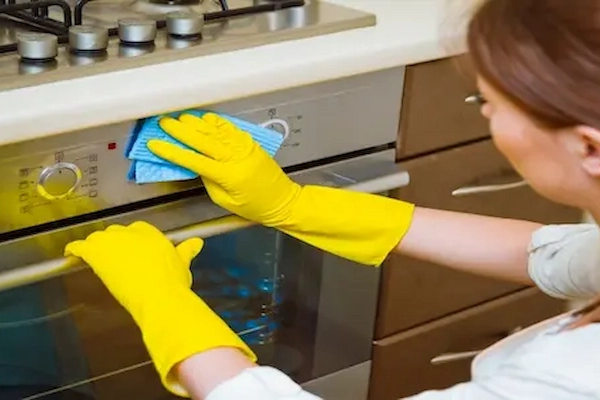
Molly Maid provides this expert guidance on how often to clean household appliances for optimal performance and hygiene.
|
It has happened to all of us at one time or another—we open our refrigerator, washing machine, microwave, or oven, and encounter an unpleasant, musty odor that reminds us our appliances need cleaning. It’s then that we ask ourselves, “When was the last time I cleaned my appliances?” Unfortunately, most of us don’t give our appliances the care they need until something goes wrong. Keeping appliances clean will not only help extend their lifespan, but periodic cleaning will also improve appliance efficiency, minimize maintenance, and help you avoid making that unpleasant face every time you go to use one.
Start with the Most Frequently Used Appliances
The best approach for cleaning appliances is to start with the ones that are most frequently used. Appliances like a washing machine, refrigerator, and oven usually get the most daily usage. Cleaning one or two of these appliances will get you off to a good start. Such heavily-relied-on kitchen essentials should be cleaned fairly regularly—every 2 to 4 months—depending on daily use. Even a garbage disposal needs a little TLC every so often.
What happens when appliances, like a washing machine, don’t get cleaned regularly? Well, gunk from soap residue, fabric softener, minerals, and chemicals build up, creating a thin film that can trap bacteria. These bacteria tend to live in the detergent drawer, rubber seals around the door, and the washing drum. And we’ve all experienced the unpleasant odor associated with a neglected washing machine —it’s enough to make us lose our appetite. Even an oven and cooktop can quickly accumulate buildup within a short time. This could affect cooking time, accuracy, and have more serious consequences, like an increased fire hazard. So, keeping these daily-use appliances clean should be a top priority.
Appliance Cleaning Schedule
Once you decide on the one or two appliances you want to start with, develop a thorough cleaning process that can be repeated every few months. (Don’t have the time or energy to clean? Here’s a solution.) This should include keeping an appliance cleaning log as a reminder. Doing so will help you avoid going too long between cleanings. Keep the appliance cleaning log visible—on the refrigerator is an ideal location—so cleaning days can be coordinated with your schedule. Or add reminders to your phone to notify you two or three days in advance.
Unless you're feeling super ambitious, don't try to tackle every appliance on your list in one day. A thorough appliance cleaning can take considerable time and energy. So, start at the top of the list and gradually work your way down over the course of a few days or weeks. Before starting this cleaning project, make sure to gather all the necessary supplies—cleaning products, brushes, and especially a good pair of rubber gloves. It’s always a good idea to wear protective gloves whenever any type of cleaning solution or chemicals are handled.
How to Clean That Machine
How and what is used to clean each appliance will vary depending on the specific appliance. For example, an appliance like a washing machine can be cleaned using commercial products, or with a simple solution of white vinegar and baking soda. The white vinegar disinfects and sanitizes, while the baking soda gets rid of soap residue and neutralizes odors. Most manufacturers recommend cleaning a washing machine—especially high-efficiency models—at least once a month to avoid developing a musty smell and buildup of detergent residue. Compared to some other appliances, cleaning a washing machine doesn’t require a significant amount of time and effort. But cleaning a refrigerator can take up half the day, depending on the size and how often it's been cleaned.
Cleaning a refrigerator requires patience and a meticulous approach. When done correctly, all trays, shelves, and drawers should be removed and cleaned separately. Be extra careful when removing glass shelves, as the glass can easily become dislodged from the shelf. This is also a great time to purge leftovers and outdated items that may have overstayed their welcome. A spray bottle filled with cleaning solution, such as two tablespoons of baking soda and warm water, will do nicely to remove most of the buildup. Apply the solution liberally through the interior and wipe clean with a towel or sponge as you go. Using a toothbrush is an effective method for cleaning any hard-to-reach areas.
A Clean Appliance Operates More Efficiently
Cleaning appliances probably isn’t high on many priority lists but neglecting to clean appliances on a regular basis can eventually lead to more than just an unpleasant odor. Regular cleaning also provides an opportunity to inspect how each appliance is working, which could help identify potential issues before they become a major problem. Cleaning appliances can be a time-consuming process, which might take you away from cleaning other areas of your home. So, while you get your appliances nice and clean, contact Molly Maid to help you get the rest of your home looking its absolute best!
